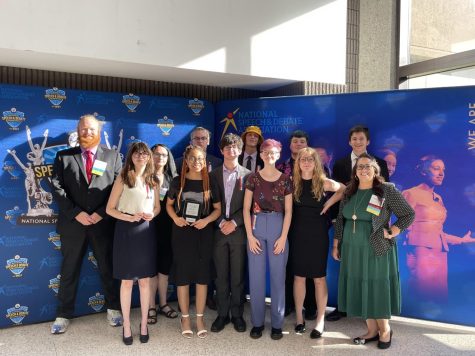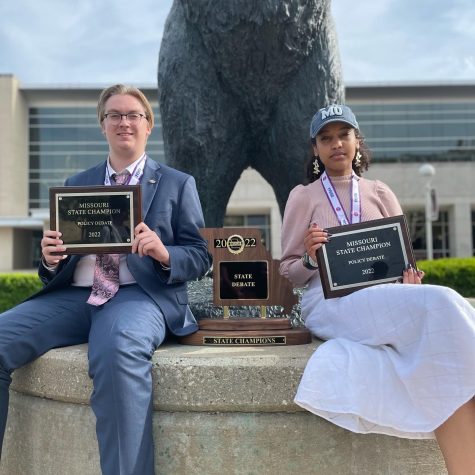Where Are Our Curriculars Going?
NKC School District Makes Budget Cuts for National Competitions, and More
October 24, 2022
In the height of the pandemic, North Kansas City Schools made the decision to cease funding for national competitions. Cuts were made for students who qualified for nationals in Debate, DECA, Future Business Leaders of America (FBLA), Science Olympiad, and Robotics.
“I think what happened was we got too broad with our [spending]. We would start spending money on sending two teachers and one student to a competition, maybe in Los Angeles, which was like twenty thousand [dollars].” Daniel Clemens, the district superintendent, said.
At first, this budget cut wasn’t a problem for these curriculars.
“We ended up having two years of virtual tournaments,” Amanda Dolinger, the debate coach at North Kansas City High School, said, “We weren’t having to worry about paying for hotels and transportation and that stuff for our students,”
That changed last school year, when in-person tournaments picked back up, when zoom calls weren’t an option anymore.
“It wasn’t really until 2022 nationals that all of us felt that impact of suddenly, we’re responsible for paying for all of it, when the district used to pay two-thirds.” Dolinger said.
For students like Trent Dixon, it changes a lot of things.
“It definitely impacted national appearance,” Trent Dixon, a former national qualifier for the North Kansas City High School debate team, said, “I think that it’s a huge problem because the national stage is a place where voices are heard. It allows us to spread our message and it truly does make change,”
However, the district has made plans to help continue to cover these fees.
“I believe we’re trying to budget five hundred dollars per student for these kinds of competitions,” Clemens said, “We can provide that transportation, we can provide those hotels, but if things go beyond that, then we might be asking for some help [from students].”
This philosophy has some cracks in it, according to Dixon.
“I think the idea of a scholarship to foot the bill is terrible,” Dixon said, “Without knowing the exact dollar amount, it’s hard to say whether or not this would alleviate the [cost] for competing at the highest level. I personally think the district should go back to helping pay a substantial amount of the national competition. That kind of support truly fosters success.”

But even though trips are expensive, Dolinger has put forth some ways for students to combat the hefty cost.
“I am never gonna let a financial dilemma be the reason that you can’t go and be great at this thing you love,” Dolinger said, “We’re doing lots of fundraisers and things throughout the year.”
Budget isn’t the only hardship for the debate team, though.
In the past year, Dixon and his debate partner, Duaa Mohammed, took the crown for First Place in policy debate on a state level, but failed to be commended.
“We didn’t get a banner or anything like the sports [teams] do,” Dixon said, “I believe we should all be held to the same standard as the sports teams, considering the positive attention we could bring to the school and the whole district. I feel like it could also increase interest in academic clubs around the school if there was a tangible award,”
Dixon’s not the only one put off by this fact.
“I mean if you’re state champs, you’re state champs. That is not an easy thing to do.” Dolinger said.

Despite these deterrents, Dixon hopes these clubs continue in the district.
“I really hope they do have a place in the future of education […] These clubs are some of the most educational extra-curriculars you can join. They give opportunities to gain confidence in yourself and truly find what you want to do as a career.” Dixon said.
He’s not alone in thinking this.
“A very important part of your high school experience is exposure and experiences outside of just your high school. So therefore, I’m always going to be supportive of it, as long as we can afford it as a school district,” Clemens said, “And in most cases, I think we can.”


